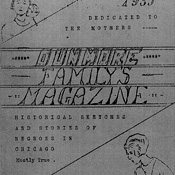Hope Dunmore / Chicago Old Settler's Club Collection
Finding Aid: Hope Dunmore / Chicago Old Settler's Club Collection
Repository:
The DuSable Museum of African American History
 Hope Ives Dunmore (1890? - 1974),
Chicago native and clubwoman, was a longtime member of Chicago's Old
Settlers Social Club, founded by Ida McIntosh Dempsey in the early
1900s.
Hope Ives Dunmore (1890? - 1974),
Chicago native and clubwoman, was a longtime member of Chicago's Old
Settlers Social Club, founded by Ida McIntosh Dempsey in the early
1900s.
Distinguishing themselves from the growing number of Southern blacks migrating to Chicago in the early twentieth century, the Old Settlers Social Club limited membership to African-American men and women who could prove their families had lived in Chicago for at least thirty years. “The object of the club,” stated in its 1923 Constitution, “is to keep the Old Settlers in touch with each other in this rapidly growing Metropolis.” Linking geographic origins to status in the community, Chicago's Old Settlers created important social, cultural, and religious networks on the South Side during the first half of the twentieth century.
In May 1935, Hope Dunmore and her family published a small pamphlet titled “Dunmore Family's Magazine: Historical Sketches and Stories of Negroes in Chicago, Mostly True.” An example of the Old Settlers' interest in preserving black history, this self-published volume illustrated black life in Chicago, and profiled the city's class of African-Americans professionals.
The materials in the DuSable Museum's Hope Dunmore / Old Settlers Social Club Collection form a fascinating record of the everyday household concerns and voluntary commitments of a family that considered itself among Chicago's African-American pioneers. The collection also highlights the Dunmore family's involvement with black freemasonry and worship at St. Thomas Episcopal Church.











